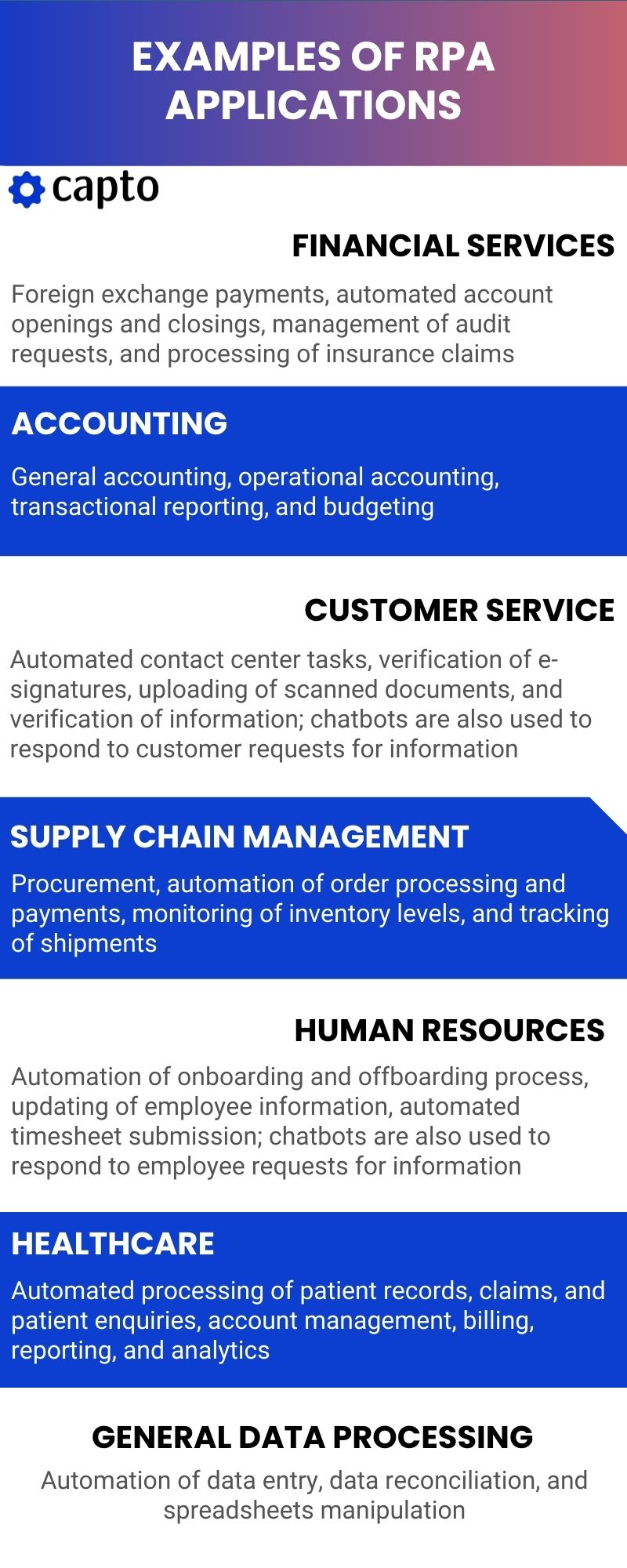In the digital world of today being adaptable is a vital requirement for each company. The technological advance creates a dynamic environment for both users and software service providers. As such, you constantly have to follow up with the innovations and expand your knowledge to keep on track. Nowadays, it is crucial to understand that one of the major prerequisites for business success is automation. This article will explain in a friendly language the robotic process automation benefits and how your business can take advantage of this modern technology. But first, let’s clarify two fundamental terms:
What is a software robot?
A robot is a machine capable of sensing and interacting with its environment. It’s an automatically operated machine that replaces human effort. However, in this article, we will not talk about physical robots, but we will use the word “robot” to refer to software robots, or “bots”. Software robots are nothing more than pieces of code. They are simple or complex computer programs designed to perform specific actions, such as automating repetitive tasks or simulating human users, among others. Software robotics is gaining popularity in business today, increasing the use of bot programs to automate computer tasks normally performed by people.
What is robotic process automation (RPA)?
Robotic process automation (RPA) is a form of business process automation based on software robots (digital workers). RPA re-creates the way humans interact with software to perform high-volume, repeatable tasks. Its ability to copy the way humans perform computer-based processes has contributed to its popularity compared with automation tools such as application programming interfaces (APIs).
RPA uses software agents (bots) to carry out routine clerical tasks without human assistance. It is useful for automating business processes that are rules-based and repetitive. RPA bots can follow a workflow that encompasses multiple steps across multiple applications. However, unlike traditional automation projects that require extensive developer help, RPA projects simply use an organization’s existing applications which makes it far more accessible, even by small and midsize enterprises.
Additionally, when combined with AI and machine learning, RPA can capture more context from the content it is processing, extract entities like names, invoice details, or addresses, and identify data from images, such as automatically estimating accident damage in an insurance claim picture. This can greatly reduce costs and increase efficiency by speeding things up and significantly minimizing errors. In other words, this means delegating repeating processes within your workflows to RPA bots.
For example, an RPA bot can be used to:
- Complete & Receive forms;
- Check for completeness;
- Use external information or proprietary databases to look up missing information;
- Enter missing data;
- Copy data between applications or workflows as required;
- Forward completed, validated forms to its next destination;
- Calculate and complete numerous tasks;
What is RPA used for?
Robotic process automation helps businesses overcome data challenges and inefficiencies by using the power of modern computer programs, thus, focusing on constant and sustainable growth. It is designed to help primarily with office-type functions that often require the ability to do several types of tasks in a specific order. Using RPA tools, a company can configure a robot to capture and interpret applications in order to process a transaction, manipulate data, trigger responses, and communicate with other digital systems.
As such, RPA provides organizations with the ability to adapt and respond quickly. What’s more, is that RPA software bots can also use machine learning algorithms and artificial intelligence to free up human employees and allow them to concentrate on more complicated tasks rather than routine work.
For example, a large commercial bank may use 100 software bots to run 15 processes that handle over 1.5 million requests in one year. Recently, the implementation of RPA in business enterprises has shown dramatic cost savings when compared to traditional non-RPA solutions.
RPA is used in most industries, particularly those that include repetitive tasks such as manufacturing, legal, insurance, banking, finance, accounting, healthcare, human resources, and telecommunications. Indeed, RPA is widely used for procure-to-pay, mortgage and lending processes, customer service and CRM, eCommerce merchandising operations, and data extraction processes, among others.
Before moving on to the core topic, let’s take a glimpse at the infographic below, showing some examples of RPA applications within different industries.

What are the robotic process automation benefits
1. Boosted efficiency
2. Increased innovation
3. Increased responsiveness
4. Flawless execution
5. Improved customer experience
6. Happier & more productive team
RPA provides even more significant benefits to your business. Here are some more examples of all you can achieve thanks to RPA:
- Invest more resources in core business operations;
- Stimulate employees to learn and take up more strategic functions;
- Generate major cost savings by automating mundane day-to-day functions;
- Enhance resilience to match workload peaks and respond to huge demand spikes:
- Reach accuracy goals with reliable consistency;
- Improve business data security;
Conclusion:
How can you take advantage of RPA?
1. Investopedia. https://www.investopedia.com/terms/r/robotic-process-automation-rpa.asp/
2. TechTarget. https://www.techtarget.com/searchcio/definition/RPA/
3. Wikipedia. https://en.wikipedia.org/wiki/Robotic_process_automation/
4. GeeksforGeeks. https://www.geeksforgeeks.org/artificial-intelligence-in-robotics/
5. Techopedia. https://www.techopedia.com/definition/32099/automation/




